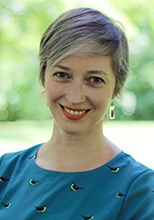Why Renewable Energy in the City is a Regional Issue
Christina Hoicka, Canada Research Chair in Urban Planning for Climate Change, University of Victoria
Abstract
Climate change is arguably society’s biggest and most existential challenge in scale and scope. The energy sector is the largest contributor to climate disruption, contributing over 80% of greenhouse gas emissions. Cities demand about 2/3 of energy globally, house most of the world’s population, are vulnerable to the impacts of climate change, and are growing. The rapid growth of cities and the increase in electric vehicles and heat pumps to decarbonize transportation and heating will require considerable new sources of electricity and grid expansion. In a low-carbon energy transition, where will these new sources of electricity come from, and how can we steer this transition so it is just? Many cities are pursuing ambitious renewable energy targets. However, there are limits on how much renewable energy cities can produce within their boundaries. Regions are now emerging as important actors in the production of renewable energy and decentralization of energy systems. Renewable energy resources can become a local economic development strategy as part of a just energy transition, and involve new actors to the energy system, such as Indigenous and rural communities and local authorities, and regional and district authorities with new opportunities for labour. This talk will outline the geography of renewable energy transitions, and the new relationships emerging between regions and cities that are pursuing ambitious renewable energy plans. It will also outline the need to measure the local socioeconomic benefits of renewable energy for communities for social acceptance and the pursuit of local economic development opportunities.
BioDr. Christina Hoicka is the Canada Research Chair in Urban Planning for Climate Change at the University of Victoria. She holds degrees in engineering, ecological economics and geography. Dr. Hoicka studies the geography of renewable energy transitions, community energy, energy citizenship, and the diffusion of low-carbon innovations in Canada and the European Union.

